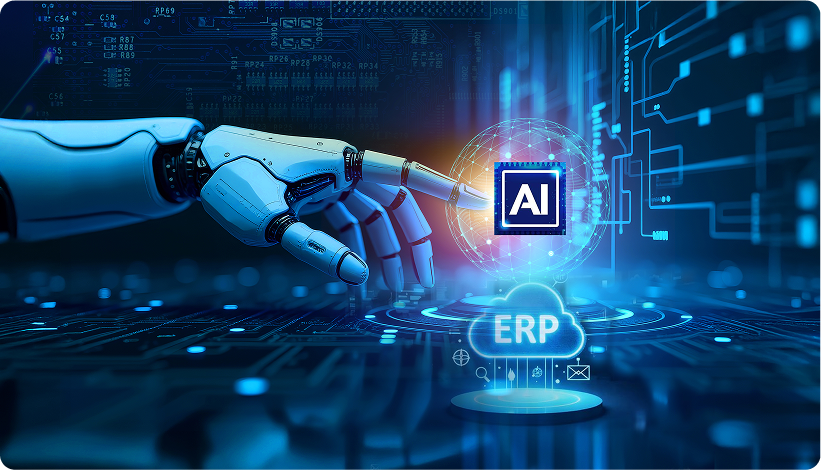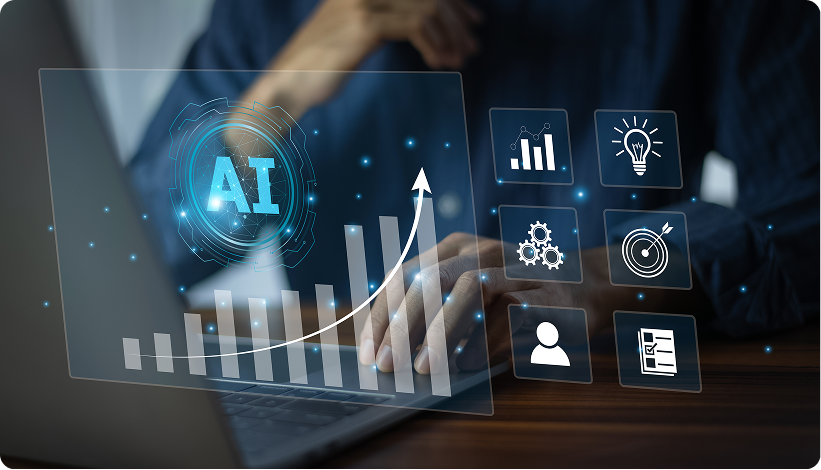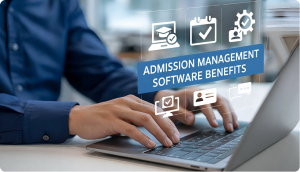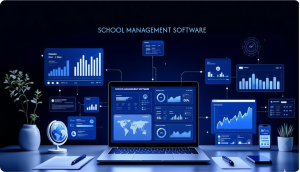
Introduction
Education is changing faster than ever. From online learning to smart classrooms, schools today are embracing technology in every possible way. But one of the biggest game-changers has been the use of Artificial Intelligence (AI) in School ERP systems. These systems are no longer just about storing data or handling paperwork, they are becoming intelligent tools that help schools teach better, manage smarter, and support students in more personalized ways.
When we talk about the role of AI in School ERP system, we’re really talking about how schools can save time, improve learning outcomes, and make better decisions using technology. From predicting student performance to sending smart reminders to parents, AI is making schools more connected and efficient.
In this blog, we’ll break down what an AI-powered School ERP system is, explore the main roles AI plays in it, and look at the real benefits schools gain when they adopt it.
What is an AI School ERP System?
A School ERP system is like an all-in-one software that helps schools run smoothly. It takes care of everyday tasks such as student admissions, tracking attendance, managing fees, creating timetables, conducting exams, and even sharing updates with parents. In the past, these systems mainly worked as digital record books that reduced paperwork and saved time.
An AI-powered School ERP system makes this much smarter. It doesn’t just store data; it understands and learns from it. With the help of technologies like machine learning and data analysis, the system can predict outcomes, give useful advice, and even personalize learning for each student. For example, it can warn teachers if a student might struggle in the next exam, automatically adjust timetables when a teacher is absent, or suggest extra learning materials for students who need them. In simple terms, it acts like a smart assistant for teachers, students, parents, and school staff, making school management more efficient and learning more effective.

Key Roles of AI in School ERP System
AI is changing the way schools work. Instead of just helping with small tasks, it supports teachers, students, and even parents in smarter and faster ways. Let’s look at the main roles AI plays inside a school ERP system and how each one makes a real difference.
1. Predictive Analytics on Student Performance
Think of this like a crystal ball for learning. The software reviews the student’s grades, attendance, and participation and can predict if they will have problems later on. For example, if grades fall and the student miss classes, the system gives teachers a heads up early on. It gives schools a chance to intervene before problems become bigger issues.
2. Personalized Learning Experience
Every student is unique, some learn fast, some need more practice. The AI makes sure that the lessons get personalized for each student. If the student is good at maths and weak at science, then the system can suggest more science practice materials. It does not discourage students and ensures that they don’t fall behind.
3. Smart Scheduling & Timetable Management
Making timetables is like a grand puzzle. Class teachers, classrooms, and subjects have to come together seamlessly. With AI, all of that can be done in a split second by making conflict-avoiding timetables. In case the teacher is absent, the system can instantaneously re-arrange classes so that learning does not get affected.
4. Remote Learning Support
Digital learning has become a large component of schooling. It facilitates remote studying by automating attendance during online classes, indicating who is active to teachers, and making recommendations on digital study resources by AI. It can also be of use in administering online tests with AI-powered surveillance.
5. Automated Grading
Grading consumes much of teachers’ time. With the help of AI, teachers can grade objective tests instantly and also evaluate essays by observing the grammar, meaning, and relevance. It not just saves teachers’ time but also makes grading fairer and more consistent.
6. Attendance & Behavior Tracking
Instead of name-calling every morning, the AI can take care of attendance through face recognition or biometric attendance systems. It can also identify patterns, like late arrival on a daily basis, and alert teachers or parents through SMS. This can soon point out students who might be needing intervention. Beyond that, the AI can also identify behavioral patterns, like late arrival or disengagement, which can be precursors of underlying issues that need to be tackled.
7. Smart Notifications & Alerts
Both parents and teachers normally overlook valuable information due to the communication gap. Artificial intelligence offers timely reminders like fee payment reminders, low attendance reminders, or exam scheduling, which could be transmitted via SMS, emails, or mobile apps. Personalized reminders make every stakeholder active and informed.
8. AI-Powered Chatbots
Schools frequently face repetitive inquiries regarding admissions, fees, timetables, and policies by students and parents. ERP-based chatbots that use Artificial Intelligence offer 24/7 support by replying promptly to frequently asked questions and decentralizing the workload of staff members.
9. Curriculum Optimization
The role of AI in School ERP system also extends to curriculum planning. AI analyzes learning outcomes, student performance, and teacher feedback to recommend curriculum adjustments. Schools can ensure their syllabus aligns with student needs, exam standards, and evolving educational trends.
10. Exam & Assessment Predictions
It can also predict how students will perform on future tests by examining past information. If the student is expected to perform poorly on the mathematics test, the system can suggest more practice or special instruction before the test date. It gives students support where it will be of the most value.
11. Data-Driven Decision Making
School leaders have to make difficult decisions quite often. AI facilitates it by converting school data into meaningful information. For example, it can be revealed which subjects require more teachers, or if the library has been utilized adequately. It will be helpful in making more intelligent decisions ahead of time.
12. Enhanced Parent-Teacher Communication
The parents greatly influence the child’s performance. AI reduces the gap by frequently providing the parents with progress reports, attendance, and behavioral notes on an automatic basis. It makes the parents informed and the parents-teacher meetings more targeted and effective.

Benefits of Implementing AI-Powered School ERP
When schools bring AI into their ERP system, they don’t just make things “smarter”, they make them simpler, faster, and more effective for everyone. Let’s look at how schools, teachers, parents, and even students can benefit:
1. Improved Overall School Efficiency
Running a school involves so many moving parts like classes, exams, staff schedules, attendance, fees, and parent communication. AI helps streamline all of this.
- How it helps: Tasks that normally take hours can now be completed in minutes. Data is updated in real time, and processes are automated.
- Example: A traditional exam schedule might take weeks to finalize because staff must manually check for conflicts. With AI, the ERP can automatically generate conflict-free exam timetables in just a few minutes.
This means schools spend less time managing tasks and more time focusing on students.
2. Reduced Administrative Workload for Staff
Teachers and administrators often spend a huge part of their time on non-teaching work like reports, paperwork, and repetitive communication. AI takes this burden away.
- How it helps: AI can handle grading, timetable planning, generating performance reports, and even answering routine parent questions through chatbots.
- Example: A chatbot built into the ERP can instantly answer common parent questions such as “When is the parent-teacher meeting?” or “How much fee is pending?”, without staff needing to respond manually.
This allows teachers to dedicate more energy to teaching and mentoring students, which is their true priority.
3. Faster Decision-Making for Management
School leaders make critical decisions daily, about admissions, performance, budgets, or staffing. AI makes this process much faster and smarter.
- How it helps: AI analyzes large amounts of data quickly and presents it in the form of easy-to-read dashboards and reports.
- Example: If the system notices that student attendance is dropping in higher classes during certain months, management can investigate the reasons early and introduce corrective measures, like flexible schedules or extra classes.
This ensures problems are spotted and solved before they grow bigger.
4. Insights for Long-Term Planning and Growth
AI doesn’t just help in the present; it also helps schools prepare for the future. By studying patterns over the years, it can guide schools in making smart long-term plans.
- How it helps: Predictive analytics can show future admission trends, subject popularity, or the need for more staff in certain departments.
- Example: If AI notices that interest in coding or robotics is growing among students, the school can plan to introduce new clubs, labs, or elective courses to meet demand.
This forward-thinking approach ensures schools stay modern, competitive, and attractive to parents and students.
Real-World Example
Let’s take the example of a mid-sized school that started using an AI-powered ERP system. Earlier, teachers spent hours preparing report cards and marking attendance manually. After switching to the new system:
- Grading time dropped by 60%, giving teachers more time to focus on teaching
- Parents received 100% timely updates on their child’s weekly progress.
- Administrators were able to identify 80% of at-risk students much earlier using predictive analytics
The results were clear, student engagement increased by nearly 40%, teacher stress levels went down, and school leaders made faster, data-backed decisions.
Conclusion
The role of AI in School ERP system is a real game-changer. It’s not just about moving schoolwork online, it makes the system smarter, faster, and more focused on students. AI can predict student performance, personalize lessons, improve communication, and cut down boring admin work, so schools run more smoothly every day.
As education continues to grow and change, schools that use AI in their ERP systems will not only manage daily tasks better but also create new chances for students and teachers to learn, connect, and succeed together.
Transform the way your school learns, teaches, and manages. Contact us now to explore AI-powered ERP solutions.




